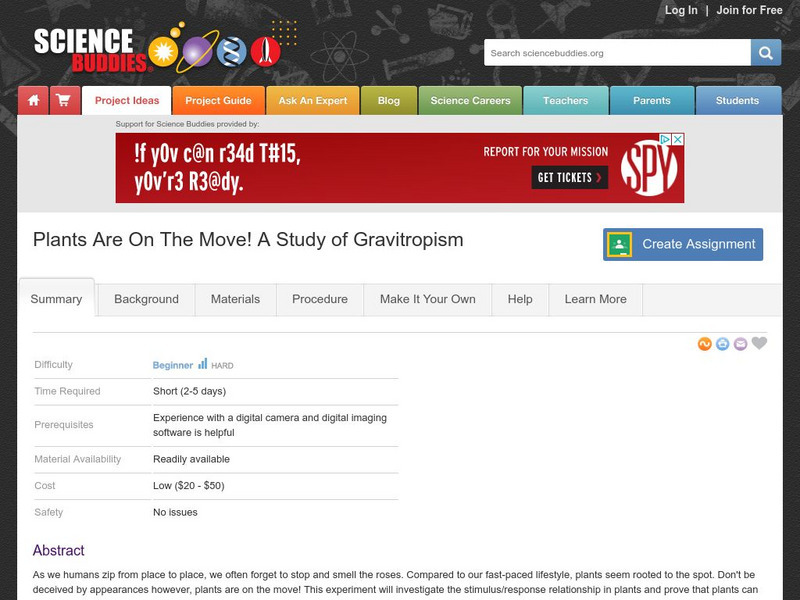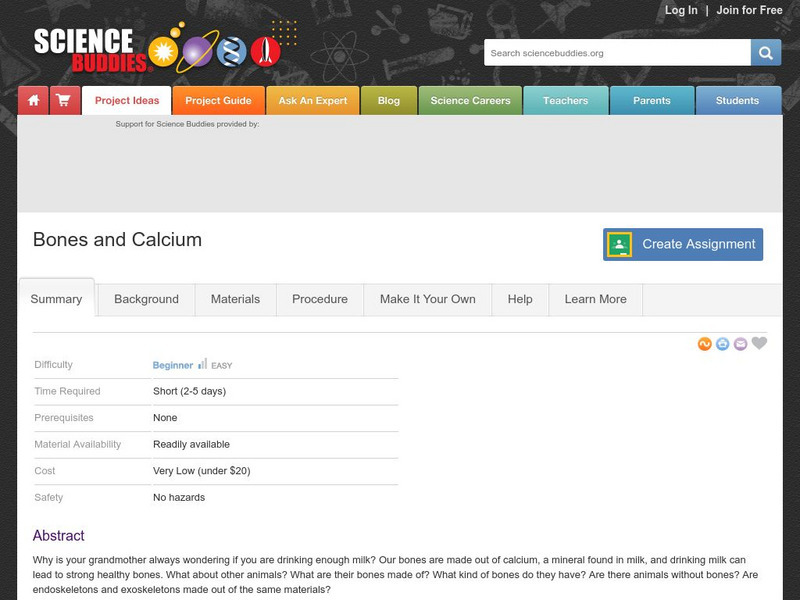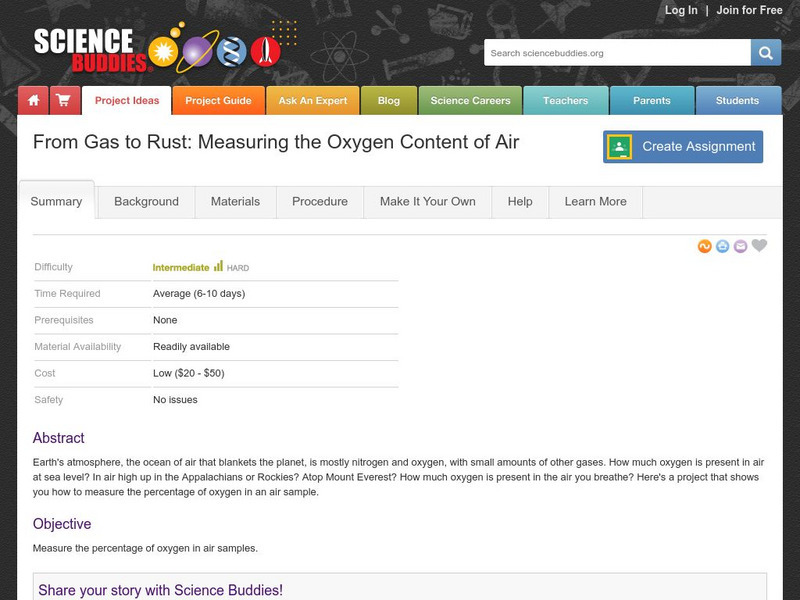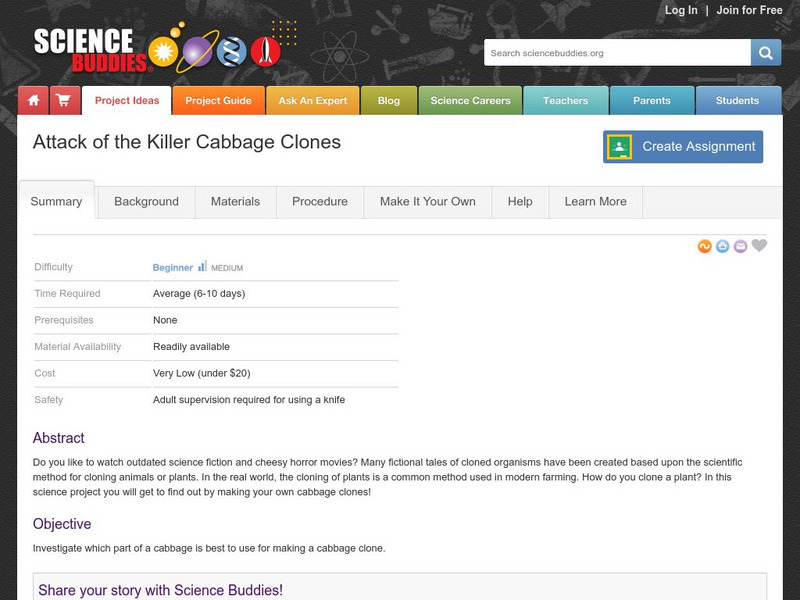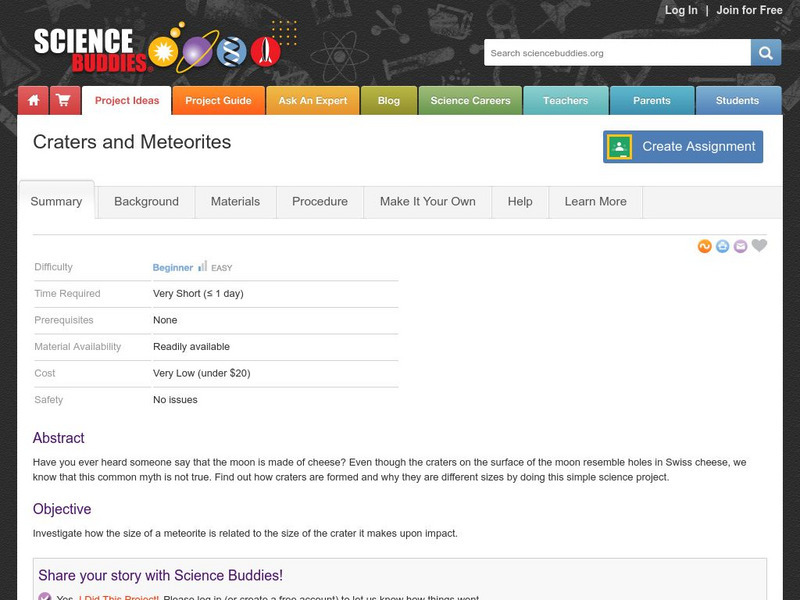Science Buddies
Science Buddies: Plants Are on the Move! A Study of Gravitropism
As we humans zip from place to place, we often forget to stop and smell the roses. Compared to our fast-paced lifestyle, plants seem rooted to the spot. Don't be deceived by appearances however, plants are on the move. This experiment...
Science Buddies
Science Buddies: How Much Worm Is a Worm?
Worms are slimy, wiggly, and gross. But did you know that they have many unique abilities? One of the neatest things that worms can do is regenerate, or re-grow, parts of their body. After a piece of a worm is cut off, it can grow back...
Science Buddies
Science Buddies: Digital Photo Resolution
Do you have a favorite picture? When you have a photo that you treasure, you want it to look as good as possible. Find out how the resolution of a digital photo effects the way it looks when you print it out. How does the quality of the...
Science Buddies
Science Buddies: Estimation and Population Size
Have you ever wanted to take a short cut? How about when doing your math homework? In this experiment you can learn how estimation can save you time doing math calculations. But beware, some estimations are better than others. Can you...
Science Buddies
Science Buddies: Bones and Calcium
Why is your grandmother always wondering if you are drinking enough milk? Our bones are made out of calcium, a mineral found in milk, and drinking milk can lead to strong healthy bones. What about other animals? What are their bones made...
Science Buddies
Science Buddies: Who Has the Biggest Genome?
Humans are complex creatures, but do we have the biggest genome? All living things, from humans to worms to bacteria have genomes. In this experiment you will compare the genome sizes of different organisms to find out who has the...
Science Buddies
Science Buddies: What Is Home Sweet Home to a Bug?
If you had to choose between having your favorite dessert, going to a movie, or spending the night at a friend's house, which would you choose? This project shows you how you can "ask" a sowbug (or pill bug) a similar question in order...
Science Buddies
Science Buddies: A Magnifying Discovery
Have you ever looked through a magnifying lens? Why do things look bigger when you look at them through the magnifying lens? Even though the object appears to get larger, it really stays the same size. Each lens has its own unique power...
Science Buddies
Science Buddies: From Gas to Rust: Measuring the Oxygen Content of Air
Earth's atmosphere, the ocean of air that blankets the planet, is mostly nitrogen and oxygen, with small amounts of other gases. How much oxygen is present in air at sea level? Is air high up in the Appalachians or Rockies? Atop Mount...
Science Buddies
Science Buddies: Measuring Up
Measurements are very important for scientists. It is especially important that the measurements be accurate. Think about how important accuracy is when you want to know if you are taller than a friend of yours, every inch counts. In...
Science Buddies
Science Buddies: A Puzzling Parallax
Did you know that ancient astronomers could measure the distance to other stars? They could also distinguish between stars and planets. How could they do that without modern technology of telescopes? See if you can discover the link...
Science Buddies
Science Buddies: Changing Constellations
Do you like to look up into the night sky? There are so many stars, it can be mind boggling. Some ancient people marked time by the changes in star patterns. We still use changes in constellation patterns to mark astronomical time. This...
Science Buddies
Science Buddies: Which Stars Can You Use for Navigation
A great science project from Science Buddies that examines how ancient peoples navigated without the benefit of a GPS. Find out which stars are important in navigation in the northern and southern hemispheres. The Science Buddies project...
Science Buddies
Science Buddies: Effects of Exercise: Changes in Carbon Dioxide Output
Everybody knows that your body needs oxygen to keep going, and that you breathe out carbon dioxide as waste. What happens when you exercise? You've probably noticed that you breathe faster, and your heart beats faster. What triggers your...
Science Buddies
Science Buddies: Lichenometry: An Accessible Method for Dating Recent History
Geology and archeology are examples of historical sciences. Their practitioners rely on multiple methods for establishing dates and temporal sequences as they seek to construct a history from the available evidence. This project will...
Science Buddies
Science Buddies: Leaves and Light
Leaves use sunlight to make food for the plant. Sunlight contains all of the colors of the rainbow, but are all of those colors used by the leaf? Can you find out if some colors of light are more important than others?
Science Buddies
Science Buddies: Attack of the Killer Cabbage Clones
Do you like to watch outdated science fiction and cheesy horror movies? Many fictional tales of cloned organisms have been created based upon the scientific method for cloning animals or plants. In the real world, the cloning of plants...
Science Buddies
Science Buddies: Do Potatoes Regulate the Formation of New Roots?
Propagate potatoes by giving it the right environment for the eyes to sprout.
Science Buddies
Science Buddies: Shoots: How Do Mint Plants Branch to Form New Stems?
Do you like to climb trees? The branches of trees are what make them so fun to climb. Each branch starts out as a tiny shoot that grows out from a stem. How is the growth of shoots along a stem regulated?
Science Buddies
Science Buddies: Craters and Meteorites
Have you ever heard that the moon is made of cheese? Even though the craters on the surface of the moon resemble holes in Swiss cheese, we know that this common myth is not true. Find out how craters are formed and why they are different...
Science Buddies
Science Buddies: Color Saturation
Lively, vivid colors can add pizzazz and turn a dull photo into a work of art. Learn how changing the saturation levels of the colors in your photo can really make it pop.
Science Buddies
Science Buddies: Measuring the Moon
Sometimes a full moon can be so bright, you can walk around in the dark without a flashlight. How much brighter is a full moon than the other phases of the moon? How is the brightness of the moon measured?
Science Buddies
Science Buddies: The 'Ultimate' Science Fair Project: Flying Disk Aerodynamics
Tossing a Frisbee with your friends is a great way to have fun in the sun. As you practice your throws and become more accurate, you're learning about the aerodynamics of Frisbee flight intuitively. You're learning the body mechanics...
Science Buddies
Science Buddies: How Food Supplements Affect Weight Gain of Juvenile Mice
As your mom and dad always tell you, a healthy diet is important to good health. This project is designed to see what happens to mice when they are allowed to load up on sugary snacks. Do you think that they will gain excess weight? Do...


